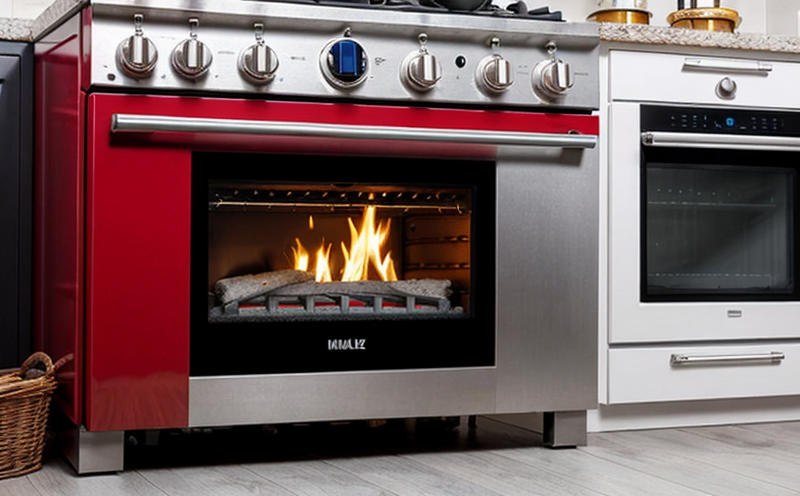Fire Safety Testing of Electric Grills and Sandwich Makers
The fire safety testing of electric grills and sandwich makers is a critical component in ensuring public safety and compliance with international standards. These appliances, despite their common use in households, can pose significant fire hazards if not rigorously tested. This service involves comprehensive evaluation to ensure that these products meet stringent fire safety requirements.
Fire safety testing aims to identify potential ignition sources within the appliance that could lead to fires under normal or reasonably foreseeable conditions of use and performance. This includes assessing the thermal management systems, electrical insulation integrity, and materials used in construction. Testing typically covers a wide range of scenarios, from operational conditions to worst-case accident situations.
Electric grills and sandwich makers are designed with numerous components that can contribute to fire hazards if not properly managed. These components include heating elements, control circuits, and power cords. The testing process focuses on these areas to ensure they do not generate excessive heat or sparks which could lead to ignition of flammable materials in the vicinity.
International standards such as ASTM E1765 and ISO 9023 provide guidelines for fire safety testing of appliances. These standards outline specific test methods to evaluate the heat release rate, flame spread performance, and thermal stability of materials used in these appliances.
The testing process begins with a detailed review of the product design and specifications to identify potential hazards. This is followed by the assembly of the appliance according to manufacturer instructions, ensuring that all components are installed correctly. The assembled unit undergoes a series of tests designed to replicate real-world conditions as closely as possible.
For electric grills, key tests include assessing the heat distribution across different parts of the grill and monitoring for any signs of overheating or sparking. For sandwich makers, testing focuses on the sealing performance of the lid and the heat generation within the chamber. Each test is conducted under controlled conditions to simulate various use scenarios.
The results of these tests are then analyzed using advanced instrumentation such as calorimeters and thermocouples. These instruments provide precise data on temperature changes and flame behavior, which helps in making accurate assessments about the fire safety performance of the appliance. Based on this analysis, a detailed report is prepared outlining any deficiencies found during testing and recommendations for improvement.
Compliance with these stringent standards not only ensures consumer protection but also aids manufacturers in meeting regulatory requirements. By adhering to international best practices, we help our clients build safer products that can be trusted by consumers worldwide.
Our expertise lies in providing thorough, accurate, and timely fire safety testing services tailored to the specific needs of electric grills and sandwich makers. With a focus on quality and compliance, we ensure that every product meets or exceeds international standards, thereby contributing to overall public safety.
Why It Matters
The importance of fire safety testing cannot be overstated in the context of household appliances like electric grills and sandwich makers. These devices are frequently used in domestic settings where they can come into contact with flammable materials such as wood, paper, or grease. A single malfunctioning component could lead to a dangerous situation.
- Reduces the risk of accidental fires
- Ensures compliance with international safety standards
- Promotes trust and confidence among consumers
- Aids in meeting regulatory requirements
- Enhances product reputation and brand image
- Minimizes potential legal liabilities for manufacturers
The fire safety testing process is designed to identify and mitigate these risks early in the development or production cycle. By doing so, it helps protect users from potential hazards while also ensuring that products are reliable and safe.
Scope and Methodology
| Test Parameter | Description | Methodology |
|---|---|---|
| Thermal Management Systems | Evaluation of how effectively the appliance dissipates heat generated during operation. | Calorimetry and thermocouple measurements to monitor temperature changes over time. |
| Electrical Insulation Integrity | Determination of whether electrical components remain intact under normal operating conditions. | Dielectric testing and visual inspections for any signs of insulation degradation or breakdown. |
| Material Flammability | Assessment of how easily the materials used in construction ignite and spread flames. | Flame propagation tests using standard flame sources like gas burners and electric igniters. |
| Sealing Performance (for Sandwich Makers) | Evaluation of the integrity of the lid to prevent leaks or accidental ignition within the chamber. | Detailed pressure testing and visual inspections for any signs of leakage or abnormal behavior. |
| Operational Conditions Simulation | Replication of typical usage conditions to assess performance under realistic scenarios. | Incorporation of various load configurations and environmental factors like humidity and temperature. |
The methodology for testing electric grills includes evaluating the heat distribution across different parts of the grill, monitoring for any signs of overheating or sparking. For sandwich makers, testing focuses on the sealing performance of the lid and the heat generation within the chamber. Each test is conducted under controlled conditions to simulate various use scenarios.
Customer Impact and Satisfaction
- Increased consumer trust in product safety
- Potential reduction in insurance premiums due to demonstrated compliance with fire safety standards
- Enhanced reputation for manufacturing quality and reliability
- Minimized risk of recalls and associated costs
- Increased market share by differentiating products through superior safety features
- Better regulatory compliance, reducing the likelihood of fines or legal action
- Our clients receive detailed reports that provide actionable insights into areas needing improvement.
- We offer training sessions and consultation services to help manufacturers understand testing requirements better.
By partnering with us for fire safety testing, customers benefit from expert analysis and recommendations which contribute significantly towards improving product quality and user confidence. This collaborative approach ensures that our clients stay ahead of industry trends and regulatory changes.





